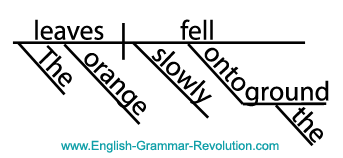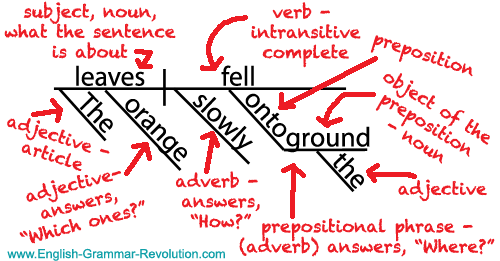Download your free grammar guide here.
Download your free grammar guide here.
Sentence Diagrams & The One Question You Should Be Asking
Sentence Diagrams & The One Question You Should Be Asking
- Home
- Teaching Grammar
- Ask This Question
As you probably know, I LOVE sentence diagrams. But helping people diagram sentences isn't my goal. My goal is to help people develop a deep understanding and love of language.
Sentence diagrams can be an excellent tool for developing your understanding of language, but there is one question you should be asking yourself in order to make sure that you're gaining a knowledge of grammar and not just the ability to diagram. (If you're a teacher, you should be asking your students this question.)
Of course, the ability to diagram sentences does indicate some level of understanding grammar, but I want you to have an understanding that you can put into words.

The Problem & The Solution
Some people are excellent at following patterns, and they can diagram sentences without knowing why they are doing what they are doing.
I saw this happen many times back when I was a classroom teacher. I would hand out an assignment, and a few students would start diagramming in a robotic manner with their eyes glazed over. I wondered Does this student understand how sentences work? Can she explain each word's function and the relationship among the words ... or is she just following a pattern?
I discovered that there's a very easy way to find out.
Ask one simple question: Why?
Look at the sentence diagram below. Let's pretend that you just finished this diagram as you moved through the exercises in one of our books or courses. The sentence is diagrammed perfectly, but how can you check to make sure that you're really understanding the grammar of the sentence?
The orange leaves slowly fell onto the ground.

In a perfect world, you would be having these kinds of thoughts going through your mind as you diagram that sentence:
The orange leaves slowly fell onto the ground.

How can you be sure that you know all of these things consciously? Ask yourself (or your students) some WHY questions.
- WHY is the prepositional phrase under the verb?
- WHY is orange diagrammed under leaves?
- WHY is slowly diagrammed under the verb?
Although you can pretty easily ask these questions of yourself about all of your diagrams, it can get a bit tedious if you do it for every part of every diagram that you make. Just be sure to sprinkle these questions here and there. Doing this is kind of like giving yourself a little pop quiz, and it helps you to really learn what you're studying.
Another Way To Check For Comprehension
One helpful alternative to constantly asking why that you can find in our Get Smart Grammar Program is to fill in a partially completed chart after diagramming each sentence.
The chart functions as a great comprehension check, and it ensures that you don't turn into a robot as you diagram.
Here's a blank chart for the above sentence.
| The orange leaves slowly fell onto the ground. |
sentence |
| leaves | |
| the | |
| orange | |
| verb (intransitive complete) | |
| adverb | |
| onto the ground | |
| onto | |
| the | |
| ground |
Here's a completed chart.
| The orange leaves slowly fell onto the ground. |
sentence |
| leaves | subject (noun) |
| the | adjective |
| orange | adjective |
| fell | verb (intransitive complete) |
| slowly | adverb |
| onto the ground | prepositional phrase (adv) |
| onto | preposition |
| the | adjective |
| ground | object of preposition (noun) |
Charts like these are woven into all of the sentence diagramming exercises in the Get Smart Grammar Program.
There you have it! Diagramming sentences is a great tool that can support the proper teaching of grammar, but it's not an end in itself. Go forth and diagram with joy as you learn grammar! :)
This is original content from https://www.english-grammar-revolution.com/sentence-diagrams.html

Hello! I'm Elizabeth O'Brien, and my goal is to get you jazzed about grammar.
I reached my dream, and I am now working as an English teacher in Spain. Your vision of grammar helped me very much in my studies. You are a fantastic teacher. The exams to be a teacher in Spain are very difficult, and you helped me. Thanks.
- Pilar, English Teacher
Our Free Guide Gives You A Fun Way
To Teach And Learn The Basics v

Elizabeth O'Brien is the creator of Grammar Revolution.
Her lessons are guaranteed to give you more confidence in your communication skills and make you smile. :)
